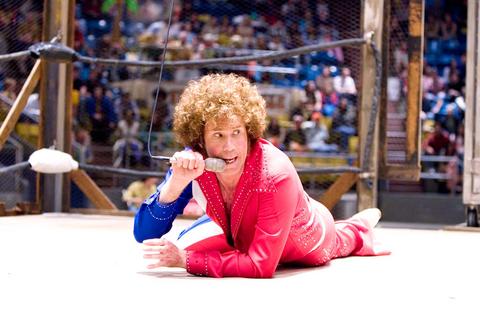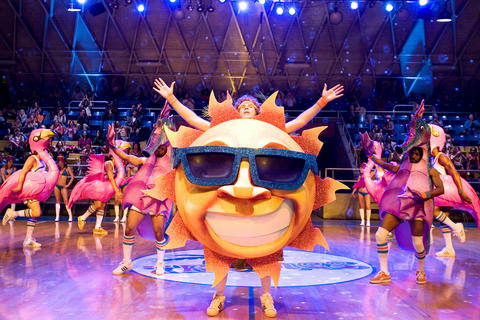A throwaway scene in Semi-Pro, a comedy starring Will Ferrell as Jackie Moon, the owner, coach, promoter and star of a struggling 1970s-era basketball team, boils Ferrell's macho man-child persona down to a sentence.
Before a game featuring Jackie's team, the Tropics from Flint, Michigan, the camera pans across cheerleaders at the base of a 30.5m ramp, then reveals Jackie at the top in roller skates and a helmet, steeling himself for an Evel Knievel-style jump. A courtside announcer declares, "The fact that Jackie has never been on roller skates before has apparently done nothing to diminish his confidence."
Ferrell's latest star vehicle, a raunchy, R-rated goof written by Scot Armstrong and directed by Kent Alterman, isn't as tenderhearted as Ferrell's Elf, nor does it hit the surreal peaks of Anchorman: The Legend of Ron Burgundy, with its jazz flute solos and gang fights between news teams. But like many of Ferrell's recent films, Semi-Pro finds the sweet spot between sports melodrama and parody, and hammers it for 90 diverting minutes.

Jackie, a one-hit-wonder pop star turned sports impresario, is a standard-issue Ferrell type: an alpha-male doofus leading like-minded dudes (including Woody Harrelson as a former bench-warming Boston Celtic and Andre Benjamin as a selfish but talented future star) on a mission of excellence. For the Tropics that means standing out during the final season of the American Basketball Association, a down-market rival of the National Basketball Association, which merged with the NBA in 1976, with only a few teams joining the fold. If Jackie's team doesn't finish at least fourth in the league and draw 2,000 spectators a game, it won't survive the merger. Desperation and inspiration ensue.
Semi-Pro is no docudrama, of course. The ABA never had a team in Flint, much less an owner-coach-player who wrestled grizzlies and promised every spectator a free hot dog if his team broke 125 points. But the film does root many of its jokes in sports history. The ABA's contributions to pro basketball include the slam-dunk contest, the three-point shot and Julius Erving, nicknamed "Dr J," who played for two ABA teams, the New York Nets and the Virginia Squires. In its absurdist way, Semi-Pro alludes to all of the above - including Dr J, who seems a partial inspiration for Benjamin's character.
Like Anchorman, Semi-Pro pictures the 1970s as a clown's bacchanal, an era that saw Age of Aquarius utopianism morph into decadent brutishness. (Jackie, an exemplar of both extremes, slaps his players and threatens referees with death, yet insists that his motto is "ELE: Everybody Love Everybody.") Between its Me Decade jukebox soundtrack, sinuous widescreen photography (by Shane Hurlbut) and fetishistic period details (including the most stunning array of big hair this side of a Tower of Power album cover), Semi-Pro often plays like a wacky, sports-themed cousin of Paul Thomas Anderson's Boogie Nights.

PHOTO: COURTESY OF ARM
While the film never coheres into a great comedy, it offers lively performances (including Will Arnett's foulmouthed, alcoholic, chain-smoking sportscaster, and Andrew Daly as his unflappably square partner).
And some of its gags are as insightful as they are ludicrous. One of the best finds Harrelson's player-turned-coach, Monix, setting up a tryst with his ex-girlfriend Lynn (Maura Tierney) by dispatching her boyfriend, an obsessive Monix fan named Kyle (Rob Corddry), to buy him a tube of Bengay. The poor dope forgets his wallet, returns to the house and catches the couple in the act, but does not react as you would expect. In fact, his response takes sports fandom to a whole new level.

June 23 to June 29 After capturing the walled city of Hsinchu on June 22, 1895, the Japanese hoped to quickly push south and seize control of Taiwan’s entire west coast — but their advance was stalled for more than a month. Not only did local Hakka fighters continue to cause them headaches, resistance forces even attempted to retake the city three times. “We had planned to occupy Anping (Tainan) and Takao (Kaohsiung) as soon as possible, but ever since we took Hsinchu, nearby bandits proclaiming to be ‘righteous people’ (義民) have been destroying train tracks and electrical cables, and gathering in villages

Swooping low over the banks of a Nile River tributary, an aid flight run by retired American military officers released a stream of food-stuffed sacks over a town emptied by fighting in South Sudan, a country wracked by conflict. Last week’s air drop was the latest in a controversial development — private contracting firms led by former US intelligence officers and military veterans delivering aid to some of the world’s deadliest conflict zones, in operations organized with governments that are combatants in the conflicts. The moves are roiling the global aid community, which warns of a more militarized, politicized and profit-seeking trend

The wide-screen spectacle of Formula One gets a gleaming, rip-roaring workout in Joseph Kosinski’s F1, a fine-tuned machine of a movie that, in its most riveting racing scenes, approaches a kind of high-speed splendor. Kosinski, who last endeavored to put moviegoers in the seat of a fighter jet in Top Gun: Maverick, has moved to the open cockpits of Formula One with much the same affection, if not outright need, for speed. A lot of the same team is back. Jerry Bruckheimer produces. Ehren Kruger, a co-writer on Maverick, takes sole credit here. Hans Zimmer, a co-composer previously, supplies the thumping

Dr. Y. Tony Yang, Associate Dean of Health Policy and Population Science at George Washington University, argued last week in a piece for the Taipei Times about former president Ma Ying-jeou (馬英九) leading a student delegation to the People’s Republic of China (PRC) that, “The real question is not whether Ma’s visit helps or hurts Taiwan — it is why Taiwan lacks a sophisticated, multi-track approach to one of the most complex geopolitical relationships in the world” (“Ma’s Visit, DPP’s Blind Spot,” June 18, page 8). Yang contends that the Democratic Progressive Party (DPP) has a blind spot: “By treating any